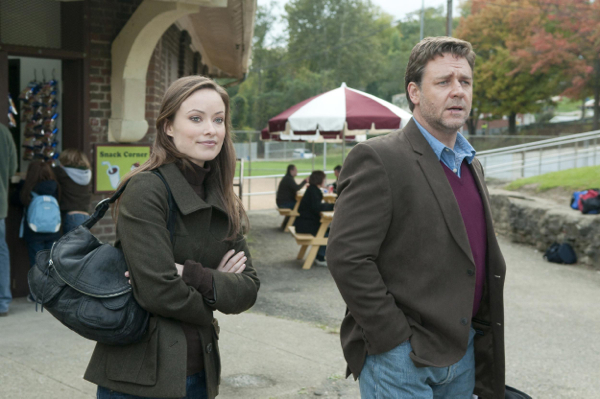Movie review by Greg Carlson
Paul Haggis tilts at windmills in “The Next Three Days,” his remake of Fred Cavaye’s 2008 French film “Pour elle.” A wildly improbable prison break thriller that casts Russell Crowe as a “Don Quixote”-interpreting community college professor hell-bent on springing his possibly murderous wife out of the clink, “The Next Three Days” trades potentially interesting characters for grinding plot points. Somber when he should be tongue in cheek, Haggis the screenwriter manages a couple tension-relieving jokes that Haggis the director glides over in favor of a painfully meticulous procedural that leisurely transforms the mild-mannered literature teacher into a cold-blooded lawbreaker willing to risk his own life and his only child’s security in the execution of a escape plan that unfolds like one of Rube Goldberg’s complex and over-engineered machines.
Crowe’s rumpled, shambling John Brennan makes an unlikely spouse to Elizabeth Banks’s Lara Brennan, a hot-tempered diabetic whose combative personality traits plant just enough doubt for the audience to imagine that she is capable of bludgeoning her boss with a fire extinguisher. John refuses to accept the guilty verdict, however, and in what is surely the movie’s bluntest “Screenwriting 101” conversation, arranges a meeting with master escape artist Damon Pennington (Liam Neeson in a single-scene cameo appearance), who outlines a bulleted list of all the things we can expect Brennan to do in the remainder of the movie’s running time.
Haggis has never been known for thematic subtlety, and “The Next Three Days” treats parenthood with an attitude so cavalier, any father or mother in the audience is likely to wonder how Brennan finds time to read bedtime stories and make lunches when he is so busy mapping out a farfetched scheme that requires falsified medical records, sabotaged phone lines, skeleton keys, forged passports, and violent, late-night raids on meth labs. Additionally, the professor creates a mural-sized diagram of his evolving caper on a wall in his house, complete with getaway routes, photos, and scrawled permanent marker reminders of dwindling financial resources (presumably so the audience understands the man’s mounting desperation).
Several scenes between Brennan and Olivia Wilde’s subtly flirtatious single mom both provide unintentional laughs (as when Brennan explains the reason for his wife’s absence with a halting and awkward claim of her innocence) and reaffirm that the man will not be winning any father of the year awards. Wilde’s character exists as an abstract temptation forecasting an alternate, Lara-free future for John, but instead of forging a friendship, the bullheaded protagonist uses the trusting woman without her knowledge once the daring liberation of his wife is underway – thus reaffirming John’s unshakable love for his spouse.
Unfortunately, Haggis shows little interest in the character of Lara Brennan, and even though the film’s trailer shows a scene in which she (misleadingly?) confesses to her husband, the filmmaker never explores more than a sliver of the moral conundrum inherent in the possibility that John could be transforming himself into a cunning criminal mastermind on behalf a remorseless killer, and by extension, unfit mother. Instead, we are left with ponderous Cervantes parallels on the relativity of sanity and the triumph of irrationality that only really work as signifiers of genre moviemaking.
